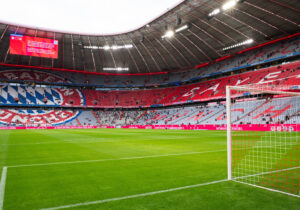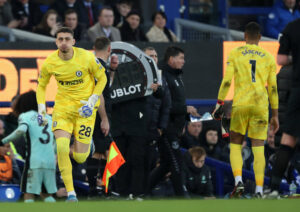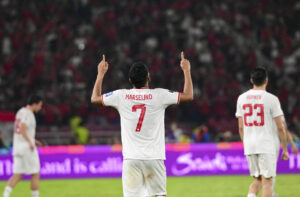And just like that, Joachim Low sees his 15-year reign in charge of the German national team come to an end.
With Germany’s 2-0 defeat to England in the last 16 of Euro 2020, Low officially bows out, and with his departure, questions will inevitably begin to materialize over his legacy.
In charge of Die Mannschaft, Low oversaw one of the golden eras of German football, which culminated in a World Cup success in 2014. But he also steered the reigns during some of the darkest days in German national team history, which included a World Cup group stage exit four years later – the only time in history that has happened.
Additionally, the last three years since the calamity in Russia were marked by excruciating inconsistency and uncertainty, concluding with the defeat to England – the first time Germany lost to their Anglo rivals in a competitive knockout fixture since 1966.
Therefore, Low’s overall legacy is complex and mirky. How should Germany and the rest of international football remember him?
Joachim Low: A Complicated German Reign
Periods of Dominance
From 2008-2014, the German national team were a menace.
Under Low (who was appointed in 2006), this is how they finished in major tournaments during that period: runners-up in Euro 2008, semi-finalists in the 2010 World Cup and Euro 2012, and then winners in the 2014 World Cup. From July 2010 to June 2012, Germany won 15 consecutive international competitive matches – a world record. After winning the nation’s fourth world championship, Low’s side received the highest ever points total in the famed World Football Elo Ratings, a statistical ranking of the best international teams.
Low’s masterful integration of Germany’s rising stars during South Africa’s World Cup in 2010 might be his best work as national team boss – even better than winning the whole competition four years later. Germany’s evisceration of England and Argentina in the knockout stages – by a combined score of 8-1 – epitomized the greatness of Low. Despite fielding one of Germany’s youngest ever tournament squads, Low trusted his players to play a quick counterattacking style, as Thomas Muller, Mesut Ozil, Bastian Schweinsteiger, Miroslav Klose and Lukas Podolski put on legendary performances. The demolition of Diego Maradona’s (and Lionel Messi’s) Argentina in Cape Town is still one of the greatest tactical masterpieces in World Cup history.
Low’s Greatest Triumph
Of course, when evaluating Low’s legacy as German boss, the first mention should be his triumph in Brazil’s 2014 World Cup. Despite getting his tactics wrong in the last 16 near defeat to Algeria (playing an absurdly high defensive line), he implemented more control and power into Germany for the rest of the tournament, including his decision to return star defender Philipp Lahm to right-back from midfield, allowing the team to play a 4-2-3-1 formation. In their final three matches, Germany conceded only once as a result (a meaningless 90th-minute goal against Brazil).
And let’s not forget about Brazil. 7-1. In Brazil. Against the five-time world champions. Four goals in six minutes. One of the most incredible results in football history. That was Low’s victory, and he deserves to be remembered for it.
Only six men have won international trophies as manager of Germany (including the country’s years as West Germany). Low is one of them. The German public, along with the rest of the world, cannot and must not forget that.
And if it were not for the dominance of Spain – one of the greatest international sides in history – Germany probably would have won more trophies under Low.
The 2018 Disgrace Under Joachim Low
If Low left Germany after 2014, he would most likely have gone down as one of the greatest international managers of all time. However, that was never really a realistic possibility, especially considering his desire to win a European championship to complement his world title. And yet, in the seven years since Germany’s glory in Brazil, the story for Low in tournaments has been significantly worse: semi-finals in Euro 2016, a group stage exit in the 2018 World Cup and now a last 16 defeat in Euro 2020.
Low did win the Confederations Cup in 2017 with a new and younger squad, which was supposed to signal change and usher in another new golden age of German football. Players such as Joshua Kimmich, Antonio Rudiger, Leon Goretzka, Julian Draxler, Emre Can and Timo Werner dominated that tournament. Low should have incorporated them more effectively in Russia a year later, especially considering how Germany looked and played worn out in Euro 2016. However, Low remained loyal to the old guard who won it all in Brazil, particularly in the opening 1-0 defeat to Mexico.
The 2018 team lacked any form of cohesion, as Low could not figure out how to set up his supremely talented squad. It could have been arrogance since Low’s Germany sides had always made at least the semi-finals of every competition under his watch. There was no way Mexico, Sweden and South Korea would prevent that. But Germany were embarrassed, losing twice and finishing bottom of their group. It was the most disgraceful exit in national team history. And it happened with Joachim Low in charge.
Just like people should not forget his peak in 2014, they should also not forget his nadir in 2018.
Recent Downfalls
The German FA should have sacked Low after the 2018 debacle. No other national team manager would have survived it. But due to the combination of loyalty to Low and the lack of any reasonable successor to take over, he was allowed to remain in charge, promising an improvement in results.
However, performances under Low never got better. Germany finished last in their UEFA Nations League group (behind the Netherlands and France), scoring three goals and conceding seven. This included a 3-0 drubbing to the Dutch, which was Germany’s largest-ever defeat to their western neighbours. Clearly, zero progress was taking shape.
Qualification for Euro 2020 went relatively smooth but doubts about Low’s abilities returned after football resumed post-Covid-enforced lockdowns. Mediocre Nations League displays for Germany came to a crescendo in November 2020, when they were throttled 6-0 by Spain. It was the nation’s largest defeat in an international match since 1931.
Calls for the German FA to sack Low (or for him to resign) immediately followed. Little had improved since 2018. Low had clearly failed to show he was the right man to lead Germany into the future. His decision in March to announce his departure after Euro 2020 was the right thing to do. Public opinion turned positively toward him once again. Maybe he could guide one more tournament run to cement his legacy.
The Verdict
Instead, Germany lost to North Macedonia in 2022 Qatar qualifiers on home soil – the first World Cup qualifying defeat for Die Mannschaft in 20 years. Then came an inconsistent final tournament for Low: four matches, with one win, a draw and two defeats. The end for Low was essentially a microcosm of his tenure: standout performances (victory over Portugal) to go along with incomprehensibly poor results (draw with Hungary, defeat to England).
Now, Low’s time is officially up. As he exits the German national scene, how will he be remembered? He presided over one of the greatest eras in German football history, bringing home the greatest international prize in the process. But he also overstayed his welcome and remained in charge of a team that never improved after the disaster of 2018. He became like an old school teacher who has clearly lost his way but refuses to retire, believing he still has something to contribute.
Clearly, Low had nothing left to give to Germany. But the question now remains: will the country forgive him for it?
Main Photo






